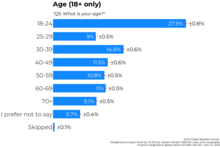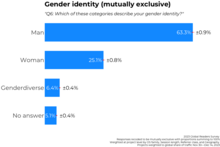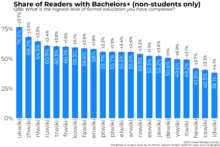Research:Knowledge Gaps Index/Measurement/Readers Survey 2023
This page documents a research project in progress.
Information may be incomplete and change as the project progresses.
Please contact the project lead before formally citing or reusing results from this page.
This project aims to understand the demographics and motivations of Wikipedia Readers across language editions. It is part of the Knowledge Gaps Index focus on Readers of Wikipedias, and continues the work of the 2019 Readers survey.
Progress on this project can be followed at T341890.
Methods[edit]
This project uses simple random sampling of Wikipedia readers using the QuickSurveys extension. The QuickSurveys opt-in will be displayed to readers who are not logged in and will ask them whether they would like to participate in a survey to help improve Wikipedia. The survey will be conducted using LimeSurvey, an external survey tool.
The sample size goals will replicate the 2019 Readers Survey, as documented in T226273.
- 10000 for large Wikipedias
- 2000-5000 for medium-sized Wikipedias
- 1500 for smaller Wikipedias
The goals of the survey are to make demographic estimates of Wikipedia readers across different language projects within the scope of the Knowledge Gaps Index, to understand motivations for reading Wikipedia, and to analyze whether there are differences by motivation and demographics in who reads which type of content.
Analyses of the survey data will primarily follow the 2019 edition of the survey.
Timeline[edit]
| Month | Goal |
|---|---|
| September 2023 | English Wikipedia pilot |
| November 2023 | Data collection on all wikis |
| December 2023 | End of data collection. Data cleaning and analysis, preliminary findings |
| January 2024 | Continued analysis |
| February 2024 | Report published on metawiki (estimated) |
Policy, Ethics and Human Subjects Research[edit]
This survey is governed by the Global Readers Survey privacy statement.
Results[edit]
Survey Administration[edit]
Surveys were fielded across 23 projects from November 14--December 18, 2023. A total of 80,242 complete survey responses were collected.
| Project | Fielding Dates | QuickSurvey Sampling Ratio | Total LimeSurvey Initiations | Total Completes |
|---|---|---|---|---|
| arwiki (Arabic) | November 28 - December 18, 2023 | 12.4% | 40526 | 5186 |
| cswiki (Czech) | November 28 - December 11, 2023 | 10.0% | 4592 | 1618 |
| dewiki (German) | November 28 - December 11, 2023 | 5.2% | 23797 | 9589 |
| elwiki (Greek) | November 28 - December 13, 2023 | 20.0% | 5557 | 1537 |
| enwiki (English) | November 14-22, 2023 | 2.0% | 40497 | 9479 |
| eswiki (Spanish) | November 28 - December 18, 2023 | 6.6% | 39071 | 8769 |
| fawiki (Farsi) | November 28 - December 11, 2023 | 2.1% | 7689 | 1850 |
| frwiki (French) | November 28 - December 11, 2023 | 9.7% | 23368 | 6617 |
| hewiki (Hebrew) | November 28 - December 13, 2023 | 8.6% | 5044 | 1609 |
| hiwiki (Hindi) | November 28 - December 18, 2023 | 20.0% | 62278 | 715 |
| idwiki (Indonesian) | November 28 - December 13, 2023 | 15.0% | 13671 | 1516 |
| itwiki (Italian) | November 28 - December 11, 2023 | 2.5% | 5855 | 1996 |
| jawiki (Japanese | November 28 - December 18, 2023 | 1.6% | 7023 | 1905 |
| kowiki (Korean) | November 28 - December 18, 2023 | 20.0% | 12800 | 1575 |
| nlwiki (Dutch) | November 28 - December 18, 2023 | 7.5% | 5420 | 1528 |
| plwiki (Polish) | November 28 - December 11, 2023 | 7.5% | 12341 | 3672 |
| ptwiki (Portuguese) | November 28 - December 18, 2023 | 15.0% | 32457 | 4619 |
| rowiki (Romanian) | November 28 - December 11, 2023 | 21.1% | 9820 | 2399 |
| ruwiki (Russian) | November 28 - December 18, 2023 | 1.5% | 15637 | 5357 |
| trwiki (Turkish) | November 28 - December 11, 2023 | 7.5% | 8568 | 1792 |
| ukwiki (Ukrainian) | November 28 - December 11, 2023 | 6.4% | 6576 | 2094 |
| viwiki (Vietnamese) | November 28 - December 18, 2023 | 7.5% | 6111 | 1075 |
| zhwiki (Simplified and Traditional Chinese) | November 28 - December 18, 2023 | 7.1% | 15841 | 3745 |
Reader Motivation[edit]
When asked what motivated them to read the article they were sampled from during the 2023 Global Readers Survey, respondents were overall most likely to say the article topic was "personally important" to them. (Respondents were able to select multiple motivations).
Similarly, at the project level, readers of all surveyed projects except for Korean Wikipedia were most likely to say they were reading the article because it is personally important to them. Korean Wikipedia readers were most likely to say they were "bored or randomly exploring Wikipedia for fun".
Reader Information Needs[edit]
Overall, Wikipedia readers are most likely to say they are are reading to "get an overview of the topic". However, reader information needs are fairly evenly distributed with 41.2% saying they are reading for an "overview", 32.1% to "look up a specific fact or to get a quick answer", and 26.0% to "get an in-depth understanding of the topic".
At the project level, Farsi Wikipedia readers are most likely to say they are looking for "an in-depth understanding" (52.5%), Hebrew Wikipedia readers are most likely to say they are seeking "an overview" (50.0%), and Vietnamese Wikipedia readers are most likely to say they need to "look up a specific fact or...get a quick answer" (42.2%).
Reader Topic Prior Knowledge[edit]
Overall, Wikipedia readers are more likely to say that they are already familiar with the topic they are reading about (55.0%) than not (44.2%).
Readers of most language projects are similarly more likely to be reading articles on topics with which they are already familiar. However, there are some exceptions: readers of Chinese Wikipedia are particularly likely to be reading on unfamiliar topics (59.5%). In contrast, Dutch Wikipedia readers are most likely to read on familiar topics (74.6%).
Reader Age[edit]
Of those 18 and older, respondents across all surveyed projects are most likely to be aged 18-24 (27.9% of readers 18+). However, the age distribution of readers varies considerably across the surveyed projects.
In particular, readers of Vietnamese Wikipedia are most likely to be under the age of 30 (61.5% aged 18-29), while Dutch Wikipedia (21.8% aged 18-29) and German Wikipedia (21.0% aged 18-29) readers are least likely to be under the age of 30.
Reader Gender Identity[edit]
In order to facilitate comparisons between surveys of Wikipedia readers and contributors to Wikimedia projects, this research employed a gender identity survey item aligned with that used in e.g., the [Community Insights survey].
Across all surveyed projects, a clear majority (63.3%) of respondents identified solely as men, 25.1% identified solely as women, 6.4% identified as genderdiverse, and 5.1% declined to provide an answer.
Readers identifying solely as men made up an outright majority in every surveyed project, but projects like Romanian Wikipedia (54.6% readers identifying as men only) and Ukrainian Wikipedia (51.7%) are substantially closer to gender parity than projects like Turkish Wikipedia (71.7%) or Indonesian Wikipedia (70.6%).
Reader Education[edit]
This research measured education with two survey items: one asking whether respondents were currently enrolled as students and a subsequent item asking non-students to indicate their level of educational attainment.
Current students[edit]
Substantial shares of readers in every surveyed project indicated that they are currently enrolled students, although this varies considerably from fewer than one-in-five overall among Dutch (19.7%) and German (19.5%) Wikipedia readers to an outright majority of Vietnamese Wikipedia readers (54.2%).
In addition, current students represent a majority of younger readers (those 18-29) in each surveyed project.
Educational attainment (non-students)[edit]
Overall, Wikipedia readers are highly-educated: a majority of non-students (56.0% total) have completed a Bachelors' degree (28.8%) or a post-graduate degree (27.2%).
At the project level, Indonesian Wikipedia readers are most likely to report an educational attainment at the upper secondary (high school) level or lower, while Polish Wikipedia readers are most likely to report holding a post-graduate degree.
Among non-students, Ukrainian Wikipedia readers (76.5%) are most likely overall to report having at least a Bachelor's degree, while Indonesian Wikipedia readers are the least likely (38.1%) relative to other surveyed projects.
Reader Languages[edit]
In general, Wikipedia readers are highly multilingual. When asked what languages they speak fluently, fewer than half (44%) say they are fluent in only one language, while more than one-in-five (21.5%) say they speak three or more fluently. However, readers are overwhelmingly reading in (one of) their primary languange(s).
In all but one surveyed project, about nine-in-ten (or more) readers say they are reading in one of their primary languages. The relative exception to this finding is English Wikipedia, where more than one-in-four say English is not one of their primary languages.
In contrast, the prevalence of monolinguality in the project language varies considerably by project. In general, East Asian language projects (and Greek Wikipedia) show the highest levels of monolinguality among readers—especially readers of Japanese Wikipedia (90.1%). Conversely, readers of German Wikipedia (22.3%) and Turkish Wikipedia (22.8%) were least likely to say they were monolingual in the project language.
Reader Identities[edit]
Minority Ethnicity[edit]
Discriminated Group Belonging[edit]
Resources[edit]
Coming soon!

























